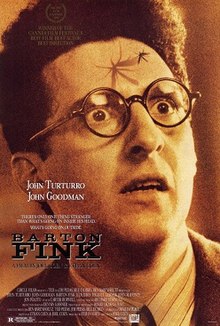
Back بارتون فينك Arabic بارطن فينك ARY بارتون فينك ARZ Бартън Финк Bulgarian Barton Fink Catalan Barton Fink Czech Barton Fink Welsh Barton Fink Danish Barton Fink German Μπάρτον Φινκ Greek
| Barton Fink | |
|---|---|
 Theatrical release poster | |
| Directed by | Joel Coen |
| Written by |
|
| Produced by | Ethan Coen |
| Starring | |
| Cinematography | Roger Deakins |
| Edited by | Roderick Jaynes[a] |
| Music by | Carter Burwell |
Production company | Circle Films |
| Distributed by |
|
Release dates |
|
Running time | 116 minutes[2] |
| Country | United States |
| Language | English |
| Budget | $9 million |
| Box office | $6.2 million |
Barton Fink is a 1991 American period black comedy psychological thriller film written, produced, edited and directed by the Coen brothers. Set in 1941, it stars John Turturro in the title role as a young New York City playwright who is hired to write scripts for a film studio in Hollywood, and John Goodman as Charlie Meadows, the insurance salesman who lives next door at the run-down Hotel Earle.
The Coens wrote the screenplay for Barton Fink in three weeks while experiencing writer's block during the writing of Miller's Crossing. They began filming soon after Miller's Crossing was finished. The film is influenced by works of several earlier directors, particularly Roman Polanski's Repulsion (1965) and The Tenant (1976).
Barton Fink had its premiere at the Cannes Film Festival in May 1991. In a rare sweep, it won the Palme d'Or as well as awards for Best Director and Best Actor (Turturro). Although the film was a box office bomb, only grossing $6 million against its $9 million budget, it received positive reviews and was nominated for three Academy Awards.
Prominent themes of Barton Fink include the writing process; slavery and conditions of labor in creative industries; superficial distinctions between high culture and low culture; and the relationship of intellectuals with "the common man". The diverse elements of the film have led it to defy efforts at genre classification, with the work being variously referred to as a film noir, a horror film, a Künstlerroman, a postmodernist film and a buddy film. It contains various literary allusions and religious overtones, as well as references to many real-life people and events – most notably the writers Clifford Odets and William Faulkner, of whom the characters of Barton Fink and W. P. Mayhew, respectively, are often seen as fictional representations. Several features of the film's narrative, particularly an image of a woman at the beach which recurs throughout, have sparked much commentary, with the Coens acknowledging some intentional symbolic elements while denying an attempt to communicate any single message in the film.
Cite error: There are <ref group=lower-alpha> tags or {{efn}} templates on this page, but the references will not show without a {{reflist|group=lower-alpha}} template or {{notelist}} template (see the help page).
- ^ "Barton Fink (1991)". AFI Catalog of Feature Films. Retrieved March 20, 2023.
- ^ "Barton Fink (15)". Rank Film Distributors. British Board of Film Classification. Retrieved February 16, 2023.